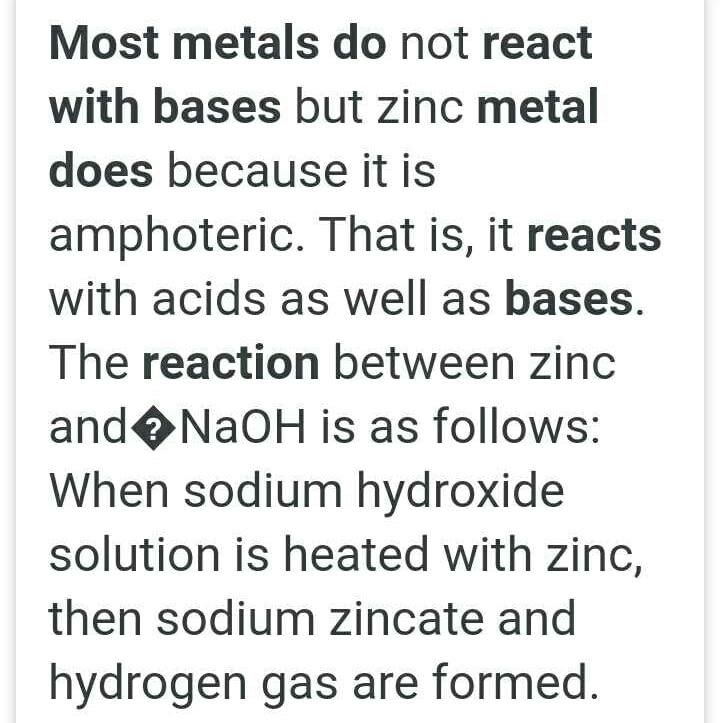Class 10 Exam > Class 10 Questions > Why do all metals do not react with bases ?
Start Learning for Free
Why do all metals do not react with bases ?
Most Upvoted Answer
Why do all metals do not react with bases ?

Community Answer
Why do all metals do not react with bases ?
Why do all metals do not react with bases?
Introduction
Metals are known for their ability to react with acids and produce hydrogen gas. However, not all metals react with bases. This is because the reaction of a metal with a base depends on various factors such as the reactivity of the metal, the strength of the base, and the nature of the metal oxide.
Reactivity of the Metal
The reactivity of a metal determines its ability to react with a base. The more reactive a metal is, the more likely it is to react with a base. For example, alkali metals such as sodium and potassium are highly reactive and readily react with bases to form metal hydroxides and hydrogen gas.
Strength of the Base
The strength of the base also plays a crucial role in determining whether a metal will react with it or not. Strong bases such as sodium hydroxide and potassium hydroxide are highly reactive and can react with a wide range of metals. On the other hand, weak bases such as aluminum hydroxide and magnesium hydroxide are less reactive and require more reactive metals to react with.
Nature of the Metal Oxide
The nature of the metal oxide formed also influences the reaction of a metal with a base. Some metal oxides such as those of aluminum and zinc are amphoteric, which means they can react with both acids and bases. As a result, metals such as aluminum and zinc can react with both acids and bases. However, other metal oxides such as those of copper and silver are insoluble in water and do not react with either acids or bases.
Conclusion
In conclusion, the reaction of a metal with a base depends on various factors such as the reactivity of the metal, the strength of the base, and the nature of the metal oxide. While some metals readily react with bases, others do not react at all. The ability of a metal to react with a base is an essential aspect of its chemical behavior and has numerous practical applications in various industries.
Attention Class 10 Students!
To make sure you are not studying endlessly, EduRev has designed Class 10 study material, with Structured Courses, Videos, & Test Series. Plus get personalized analysis, doubt solving and improvement plans to achieve a great score in Class 10.

|
Explore Courses for Class 10 exam
|

|
Similar Class 10 Doubts
Why do all metals do not react with bases ?
Question Description
Why do all metals do not react with bases ? for Class 10 2024 is part of Class 10 preparation. The Question and answers have been prepared according to the Class 10 exam syllabus. Information about Why do all metals do not react with bases ? covers all topics & solutions for Class 10 2024 Exam. Find important definitions, questions, meanings, examples, exercises and tests below for Why do all metals do not react with bases ?.
Why do all metals do not react with bases ? for Class 10 2024 is part of Class 10 preparation. The Question and answers have been prepared according to the Class 10 exam syllabus. Information about Why do all metals do not react with bases ? covers all topics & solutions for Class 10 2024 Exam. Find important definitions, questions, meanings, examples, exercises and tests below for Why do all metals do not react with bases ?.
Solutions for Why do all metals do not react with bases ? in English & in Hindi are available as part of our courses for Class 10.
Download more important topics, notes, lectures and mock test series for Class 10 Exam by signing up for free.
Here you can find the meaning of Why do all metals do not react with bases ? defined & explained in the simplest way possible. Besides giving the explanation of
Why do all metals do not react with bases ?, a detailed solution for Why do all metals do not react with bases ? has been provided alongside types of Why do all metals do not react with bases ? theory, EduRev gives you an
ample number of questions to practice Why do all metals do not react with bases ? tests, examples and also practice Class 10 tests.

|
Explore Courses for Class 10 exam
|

|
Suggested Free Tests
Signup for Free!
Signup to see your scores go up within 7 days! Learn & Practice with 1000+ FREE Notes, Videos & Tests.

























